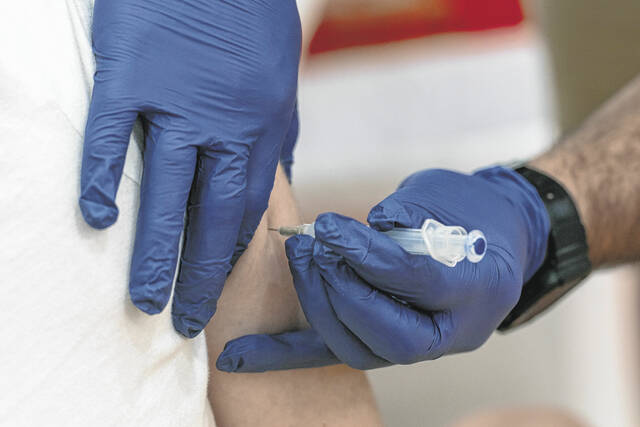The three area hospitals that serve Johnson County are starting to see some of the worst conditions of the pandemic yet.
Local health officials never thought they would be battling COVID-19 this long after vaccines were made widely available. But with just 60.4% of county residents and 54.6% of Hoosiers vaccinated, hospitals are still strained.
Local doctors say getting vaccinated — including the booster shot — is more important than ever due to the highly contagious omicron variant.
Here’s why they say you should get it:
1. COVID-19 patients are unvaccinated
Hospitals serving Johnson County are full, in part, due to unvaccinated COVID-19 patients. When COVID-19 patients are admitted to the hospital, they stay for longer periods of time and require much more care than the average patient.

Seventeen patients were waiting for a bed Wednesday morning in Johnson Memorial Hospital’s emergency room, while 11 unvaccinated COVID-19 patients occupied beds, said Dr. David Dunkle, president and CEO.
Considering how quickly the omicron variant is spreading, there is a high likelihood that both those are are unvaccinated and vaccinated will end up with COVID-19. A study from the University of Texas at Austin estimates 800,000 cases per day nationally if the situation stays the same as the variant spreads.
Without more people getting vaccinated, a scenario such as that, with thousands of cases per day in Central Indiana, is possible, said Dr. Ram Yeleti, chief physician executive with Community Health Network.
“That’s what we are so scared of. It is so contagious. A significant population is going to get the virus,” Yeleti said. “From a health care standpoint, we won’t be able to see you. We will have an 8- to 12-hour wait at our emergency rooms and MedChecks.”
Those who are vaccinated are less likely to require hospitalization, though, doctors said.
2. Prior infection does not offer good protection
The antibodies provided by a prior COVID-19 infection have never been considered as good as the antibodies provided by a vaccine, but omicron’s new spike proteins make that even more clear.
Omicron’s aggressive spike proteins are better at getting past both natural immunity and vaccines, studies show.
Omicron presents a strong risk of reinfection, but the risk can be significantly reduced by getting vaccinated and boosted, said Dr. Paul Driscroll, executive medical director for Franciscan Physician Network.
“We can’t emphasize enough how really important it is for them to avail themselves of this lifesaving treatment that can prevent serious illness, death and avoid COVID long haul syndrome,” Driscoll said.
3. Vaccines protect against serious infection
Local hospital officials say breakthrough infections are becoming more common due to the omicron, but those cases rarely land someone in the hospital, or worse, a critical or intensive care unit.

State data backs that up. To date, there have been 101,623 reported breakthrough cases in Indiana, which is just 2.8% of vaccinated Hoosiers. Of those breakthrough cases, 1,983 have been hospitalized, and 1,071 have died. Together, those serious cases represent less than 1% of vaccinated Hoosiers. About 89% of the deaths despite vaccination were among Hoosiers ages 79 and older.
Breakthrough infections are more commonly treated in an outpatient capacity, or with a call to a primary care physician for advice, Dunkle said.
4. Booster adds protection against infection
Early data, from both real world and laboratory studies, show the two mRNA vaccines from Moderna and Pfizer are less effective against the omicron variant.
Despite vaccination, people with two doses are more likely to become symptomatically ill.
“Pfizer provides about 80% (protection) against infection and Moderna shows similar results. It is about 35% (effective) after two doses and 80% (effective) after a third dose,” Driscoll said. “That third dose dramatically primes the immune system against infection.”
The Centers for Disease Control and Prevention is encouraging everyone ages 16 and older to get a booster shot when they becom

e eligible. Fully vaccinated individuals should get a booster shot two months following a Johnson and Johnson vaccine, or six months following their second Moderna or Pfizer dose.
“If people follow the recommendation and get a booster shot, they are protected,” Driscoll said. “People who don’t do that are at extreme risk. With a virus this transmissible, everyone is going to get it eventually.”
Boosters are important, but Dunkle is focused on getting those initial doses to more people, as about 40% of county residents remain unvaccinated.
5. Omicron has limited treatment options
Because omicron is more resistant to antibodies, the most readily available treatments are less effective.
The one antibody treatment that remains effective is in short supply, said Dr. Lindsay Weaver, the state’s chief medical officer.
Hospitals are getting so many requests for antibody treatments that those requests are hard to fulfill, Driscoll said.
“The biggest problem is we just haven’t been able to get that much of it,” he said. “We have an infusion center with the capability of treating 16 patients a day, but we get many more requests than that.”
New antiviral pills from Merk and Pfizer are on the way to patients, but are also in short supply, Weaver said.
The state will soon deliver more than 4,800 Merck pills to CVS and Walmart pharmacies. However, those are only available with a prescription, and can only be taken by those at high risk within the first five days of infection, she said.
A little more than 1,000 Pfizer pills were delivered to hospitals around the state, but not all hospitals received the pills because they came in boxes of 20. Due to the limited supply, those will only be used in the most severe cases, Weaver said.
The shortages are expected to get worse as cases rise.
“Yeah there are drugs out there, but we won’t have enough to treat everyone,” Yeleti said. “When you start to see 800,000 cases per day, there’s not going to be enough.”





